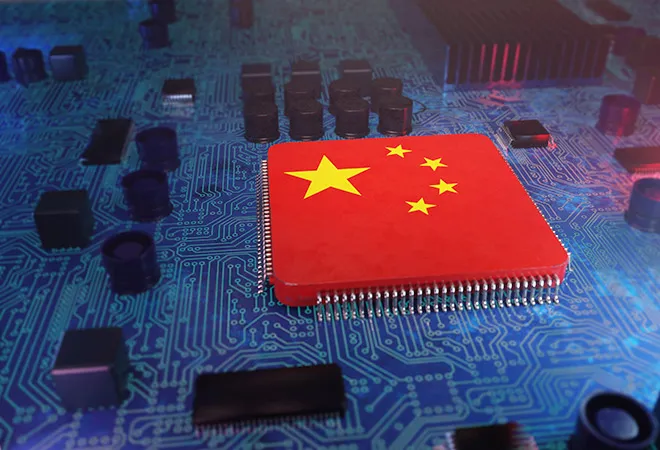-
CENTRES
Progammes & Centres
Location

On 1 April, Freedom Watch, U.S.A., filed a complaint against the People’s Republic of China (PRC), the People’s Liberation Army, Wuhan Institute of Virology (WIV) and its director Shi Zhengli for designing and subsequent release of novel coronavirus, categorized as biological weapon, with the International Criminal Court (ICC) to open an inquiry under Article 15 of the Rome Statute.
However, the contention of the Plaintiffs that China created the biological weapon, albeit without any direct evidence is more like speculation. But this suit does raise a larger question of whether there exists any mechanism under international law, to make the Chinese establishment accountable for their mismanagement and subsequent failed cover-up of Covid -19, which led to 2,954,222 cases and 202,597 deaths, as reported by World Health Organisation (WHO). The answer to these questions is in affirmative, as there are ample evidences that proves that acts of negligence and failed cover-up by China’s state actors.
South China Morning Post, citing the unpublished Chinese government records, reported that the first instance of the Covid-19 virus was noticed as early as in 17 November last year. However, downplaying of early alarms raised by doctors and journalists and inactions by various agencies in Wuhan, and not acknowledging the outbreak in a timely manner by Chinese President Xi Jinping and the Communist Party of China (CPC), has pushed the entire world into catastrophe. Due to series of missteps and flawed responses by Chinese authorities, it wasn’t until 12 January, when Chinese officials shared genome sequence to WHO.
Even as the cases started to increase exponentially since first reported case on 17 November to record 266 cases on 31 December, and 381 on the first day of 2020, medical authorities withheld authorization to report the outbreak internally and to the public, despite dire warnings from frontline doctors. Any evidence of significant person-to-person transmission of virus was ruled out on 14 January, by the WHO, falling short of declaring public health emergency. Only after first acknowledgment of the outbreak by President Xi Jinping on 20 January, that virus can be transmitted between humans, Wuhan was put under lockdown on 22 January. But by then five million travelers had already left Wuhan through air, posing severe threat to the world.
Amidst these developments, when it was observed that two-thirds of the sample of victims were linked to Huanan Seafood Wholesale Market, the same was closed on 1 January itself, a day after China reported the outbreak to the WHO. The WHO, instead asked countries not to impose travel restriction in February. However, closing of the Huanan Seafood market is a tacit acceptance on the part of CPC, that person-to-person transmission have originated from there itself.
This prompt reaction by the CPC stemmed out of a realization that southern China is already is on the hotbed, where lack of biosecurity measures in dealing with the presence of a large reservoir of SARS-CoV-like viruses in horseshoe bats, along with the culture of eating exotic mammals in southern China, is set to trigger a novel virus from animals to humans, which would be more devastating than in 2003.
The 2003 SARS outbreak prompted China to prohibit the breeding, transport, and sale of civets and other wild animals, but the ban was lifted six months later. Even now China has imposed only a temporary ban of its wet markets, despite the acting executive secretary of the UN Convention on Biological Diversity has called for a blanket ban on wildlife markets across the world, including that in Wuhan. Besides, detaining of eight doctors by Wuhan Public Security who posted information about virus on social media exemplifies the opaque governance system in China.
Given, China’s experience in dealing with SARS pandemic in 2003, it was very much possible for CPC to at least contain the infection in China by acting upon the directives of the International Health Regulations (IHR) by simply sharing timely and accurate information with the WHO on pandemic. But omissions on the part of Chinese establishment allowed COVID-19 to spread throughout the world, impacting global health and economy, unprecedently, displaying a deliberate act of mendacity.
Therefore, to preserve a rule-based international system and protect the right to life, health and freedom, it necessitates the countries to come together to explore suitable legal action against those who are responsible for the wrongful acts. Some of the potential remedies against these are could be explores as under.
As regard breach of an international obligation, China failed to adhere with its due diligence obligations by not sharing relevant and timely information deliberately and through gag orders, ordering biotech companies to stop testing. Due diligence is a standard of good governance, assessing whether a state has done what was reasonably expected of it when responding to a harm or danger. This standard, which is in built in several rules of conventional and customary international law, applies inter-alia to environment, human rights and global public health. These rules, which impose obligations of conduct requiring states, to prevent, stop and/or redress a range of internal or transboundary harms, or the risk thereof, was not adhered with by China. Further, by failing to expeditiously and transparently sharing information with WHO, in accordance with the IHR and subsequently extending its breach over the entire period during which the act continued and remained not in conformity with the international obligations, China also violated Article 14 of ARSIWA. Notably, an epidemiological model by the Southampton University, pointed out that, had China acted responsibly just one, two, or three weeks more quickly, the cases would have reduced by 66%, 86%, and 95%, respectively.
Furthermore, Article 15, grants power upon the office of the prosecutor at the ICC to initiate investigations proprio motu (on one’s own initiative) based on information on crimes within the jurisdiction of the court as has been the case with above mentioned appeal. Having said all the above, the jury is out regarding whether ICC has any jurisdiction over China. Although, popular sentiment is of dragging China to the ICC, the same must be done after thorough examination of legal matrix at hand, as has been the case in an Appeal No. ICC-02/17 OA4, wherein prosecutor was allowed to open and conduct an investigation into the conduct of members of the US military in Afghanistan, despite the US not being a member of the ICC.
Moreover, Article 75 stipulates that any dispute concerning the interpretation of the WHO constitution shall be referred to the International Court of Justice (ICJ). Reading the aforesaid as a holistic whole, could possibly allow the ICJ to invoke its contentious jurisdiction to if nothing at the very least assess Chinese liability, omissions, and commissions. We reiterate that this possible finding by the ICJ against China is in nowhere enforceable against China, but nonetheless can be the first step towards bringing about a substantial legal finding after due application of the judicial mind.
All the above can be employed as a strong quasi-judicial and diplomatic pressure tactic on China in order to make her accountable.
Aditya Manubarwala is an Advocate practicing at the Supreme Court of India and former Special Advisor to Office of the President of Afghanistan.
Disclaimer: The views expressed in this article are those of the authors, not their organizations.
The views expressed above belong to the author(s). ORF research and analyses now available on Telegram! Click here to access our curated content — blogs, longforms and interviews.

Manish Vaid is a Junior Fellow at ORF. His research focuses on energy issues, geopolitics, crossborder energy and regional trade (including FTAs), climate change, migration, ...
Read More +
Aditya Manubarwala is an Advocate practicing at the Supreme Court of India.He has previously served as Special Advisor on International Law to the Office of ...
Read More +